Hello, and welcome to the eighth iteration of Tinto Talks where we talk about what we are doing in our very secret future game, with the code name Project Caesar.
Btw, on a completely unrelated note, Paradox Tinto has just announced our new expansion ‘Winds of Change’ for EU4. Go check out its cool contents and trailer!
This week we’ll continue talking about the economical part of the game. Last week we talked about the different items in the monthly budget, and now we’ll continue with explaining some of the core concepts of the economy. Please be aware that all images here are tooltips or parts of tooltips, and some are very much Work in Progress!
Loans and Bankruptcy
Let's start with Loans, which will work a fair bit differently than any other previous Paradox GSG. At first glance, it is kind of similar to previous games, where you can take a loan, you get money, and you pay interest on it for a set period of time. However, in Project Caesar, there are some new changes. Take a look at this WiP tooltip for taking a loan:
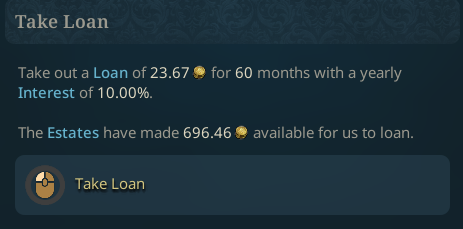
Yeah, 10% interest is perfectly fair…
In this game, you are not borrowing money from an abstract national bank, but instead, your internal loans are taken from what the estates have made available. The estates invest money they have, not only in immediate gains for their own power, or other ways that benefit the country, or other [REDACTED], but they also invest in having money available for the country, where they will benefit from the interests.
If there is no money to borrow from the estates available and you have no ducats left, you will go bankrupt, which is a little bit more severe than in, let's say EU4...
There is also another way to get gold, you can send a diplomat to one of the banking countries, like Peruzzi and Bardi, if there is one that you know of within diplomatic range, to request a loan. Make sure you don’t forget to pay them on time, or default on the loans, or you may never be able to loan from them again.
Core Concepts
So let’s continue, by taking a look at the tooltip for a location, so we can quickly have a reference to some important aspects in the rest of this development diary.
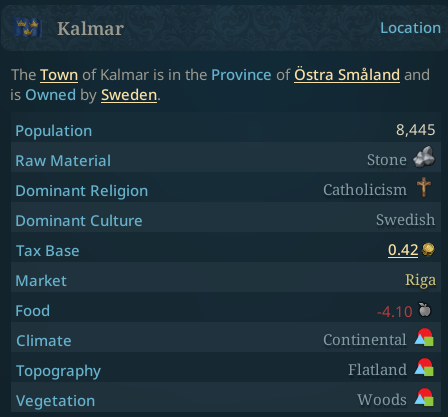
Enjoy the nice placeholder icons, sadly the forum does not allow for nested tooltips, like the game does…
Food
If you notice the line of food above, you see that Kalmar is not self-sufficient in food, and needs to rely on the rest of Östra Småland for food, unless they buy it from the local market.
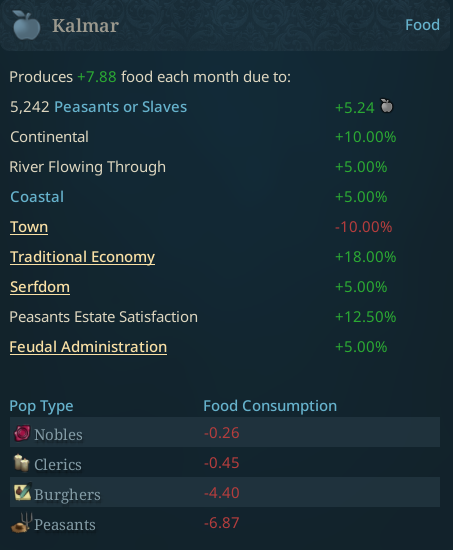
Even the small town of Kalmar needs food from nearby locations…
Primarily, there are a lot of burghers here that consume a lot of food. There are also a lot of modifiers that impact how much food the location produces as well.
If the granaries in Östra Småland are close to full, we would sell their surplus to the local market in Riga, but only get about 56% of the profit, as we only have 56% control in Kalmar. If the entire province lacks food, we would have to buy food at 100% of the current price in that market. The price for food is different in each market, and depends entirely on how much food is sold to that market.
Taxes
We mentioned taxes in last week's Tinto Talk, and specifically mentioned Tax Base there. The tax base of an estate is based on the total of all their Tax Base in all the locations they are present in.
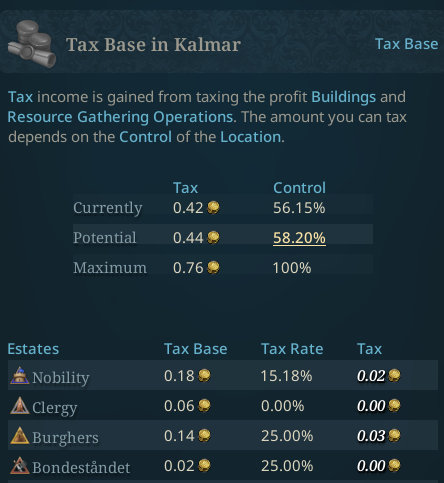
Quickly find the error in the text in this tooltip!
We are slowly increasing our control over Kalmar up to 58.2%, so the tax base will be slowly increasing, and if we would get it to the 100 maximum, it would be even bigger.
As you can see here, the nobility and the burghers have a fair bit of power here, and the peasants have basically none. Currently, we are able to tax more from the burghers each month, and could probably go above the 25% tax rate we have currently set on their estate.
To clarify, only the money that is in the “potential” row exists, and anything you don’t tax on that goes to the estates. So you get 0.05 ducats there (perhaps more, but Paradox rounding), and the remaining 0.37 goes to the estates.
Raw Materials
As you noticed in the tooltips above, we talk about Raw Materials and Resource Gathering Operations. Every location has one raw material possible that can be extracted, this includes things like lumber, stone, grain, amber, or copper. Of course, there are other ways to get access to the raw materials than merely owning and controlling a location.
Only peasants and slaves will work on gathering raw materials, and how many will work with it depends on how big of an infrastructure you have built up for that. Pops that are working with this will not be producing food, unless the goods are food related.
The maximum size of an infrastructure that can be built up depends on population, development, technologies, and societal values.
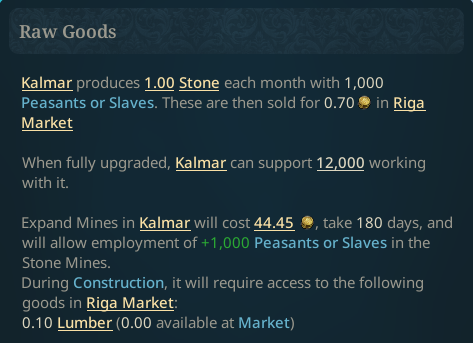
We mentioned buildings in one tooltip earlier, and next week we will talk about how they work in Project Caesar.
Btw, on a completely unrelated note, Paradox Tinto has just announced our new expansion ‘Winds of Change’ for EU4. Go check out its cool contents and trailer!
This week we’ll continue talking about the economical part of the game. Last week we talked about the different items in the monthly budget, and now we’ll continue with explaining some of the core concepts of the economy. Please be aware that all images here are tooltips or parts of tooltips, and some are very much Work in Progress!
Loans and Bankruptcy
Let's start with Loans, which will work a fair bit differently than any other previous Paradox GSG. At first glance, it is kind of similar to previous games, where you can take a loan, you get money, and you pay interest on it for a set period of time. However, in Project Caesar, there are some new changes. Take a look at this WiP tooltip for taking a loan:
Yeah, 10% interest is perfectly fair…
In this game, you are not borrowing money from an abstract national bank, but instead, your internal loans are taken from what the estates have made available. The estates invest money they have, not only in immediate gains for their own power, or other ways that benefit the country, or other [REDACTED], but they also invest in having money available for the country, where they will benefit from the interests.
If there is no money to borrow from the estates available and you have no ducats left, you will go bankrupt, which is a little bit more severe than in, let's say EU4...
There is also another way to get gold, you can send a diplomat to one of the banking countries, like Peruzzi and Bardi, if there is one that you know of within diplomatic range, to request a loan. Make sure you don’t forget to pay them on time, or default on the loans, or you may never be able to loan from them again.
Core Concepts
So let’s continue, by taking a look at the tooltip for a location, so we can quickly have a reference to some important aspects in the rest of this development diary.
Enjoy the nice placeholder icons, sadly the forum does not allow for nested tooltips, like the game does…
Food
If you notice the line of food above, you see that Kalmar is not self-sufficient in food, and needs to rely on the rest of Östra Småland for food, unless they buy it from the local market.
Even the small town of Kalmar needs food from nearby locations…
Primarily, there are a lot of burghers here that consume a lot of food. There are also a lot of modifiers that impact how much food the location produces as well.
If the granaries in Östra Småland are close to full, we would sell their surplus to the local market in Riga, but only get about 56% of the profit, as we only have 56% control in Kalmar. If the entire province lacks food, we would have to buy food at 100% of the current price in that market. The price for food is different in each market, and depends entirely on how much food is sold to that market.
Taxes
We mentioned taxes in last week's Tinto Talk, and specifically mentioned Tax Base there. The tax base of an estate is based on the total of all their Tax Base in all the locations they are present in.
Quickly find the error in the text in this tooltip!
We are slowly increasing our control over Kalmar up to 58.2%, so the tax base will be slowly increasing, and if we would get it to the 100 maximum, it would be even bigger.
As you can see here, the nobility and the burghers have a fair bit of power here, and the peasants have basically none. Currently, we are able to tax more from the burghers each month, and could probably go above the 25% tax rate we have currently set on their estate.
To clarify, only the money that is in the “potential” row exists, and anything you don’t tax on that goes to the estates. So you get 0.05 ducats there (perhaps more, but Paradox rounding), and the remaining 0.37 goes to the estates.
Raw Materials
As you noticed in the tooltips above, we talk about Raw Materials and Resource Gathering Operations. Every location has one raw material possible that can be extracted, this includes things like lumber, stone, grain, amber, or copper. Of course, there are other ways to get access to the raw materials than merely owning and controlling a location.
Only peasants and slaves will work on gathering raw materials, and how many will work with it depends on how big of an infrastructure you have built up for that. Pops that are working with this will not be producing food, unless the goods are food related.
The maximum size of an infrastructure that can be built up depends on population, development, technologies, and societal values.
We mentioned buildings in one tooltip earlier, and next week we will talk about how they work in Project Caesar.


